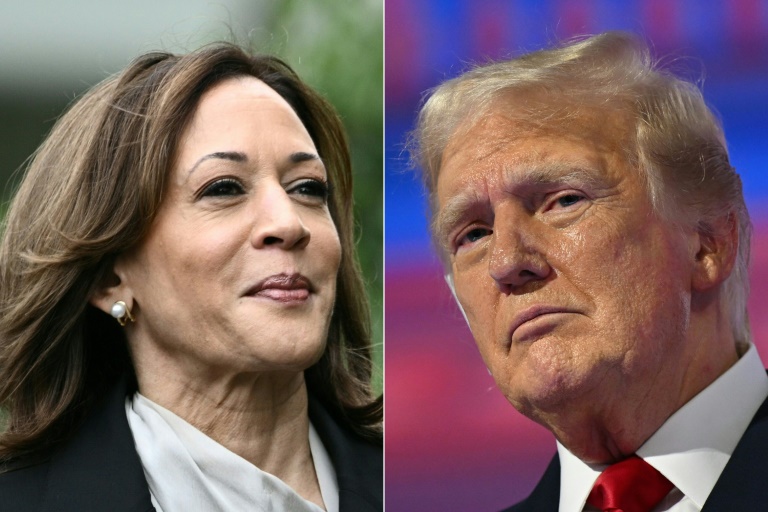A “deepfake” video parodying Kamala Harris Joe BidenA wave of AI-powered political disinformation, including doctored images of Donald Trump’s arrest, is raising concerns about the potential to manipulate voters as the US presidential election heats up.
With what is widely touted to be the first AI-enabled election in the United States scheduled for November, researchers warn that technological deception could be used to steer voters toward or away from a candidate, or even to avoid voting altogether, stoking further tensions in an already highly polarized electoral environment.
The recent wave of misinformation has rekindled calls for many tech giants, who have retreated from moderating content on social media, to tighten guardrails on generative artificial intelligence ahead of the vote.
Last week, Elon Musk faced intense criticism after he shared a deepfake video featuring Democratic presidential candidate Vice President Harris with his 192 million followers on X (formerly Twitter).
In it, a voice-over mimicking Harris calls President Joe Biden demented and goes on to declare that “she knows nothing about running a country.”
There was nothing in the video to indicate it was a parody, other than the laughing emojis, and Musk later clarified that the video was intended as satire.
Researchers expressed concern that viewers might mistakenly conclude that Harris was mocking herself and disparaging Biden.
AFP fact checkers have also uncovered other AI falsifications that have raised alarm.
A doctored video that went viral last month on the X Channel appears to show Biden hurling abuse at critics – including using anti-LGBTQ slurs – after announcing he would not seek reelection and endorsing Harris for the Democratic nomination.
A reverse image search revealed that the footage was from one of Biden’s speeches broadcast live by PBS, in which Biden condemned the political violence following the July 13 assassination attempt on President Trump.
PBS said the doctored video was a deepfake that used the company’s logo to trick viewers.
Images shared across multiple platforms a few weeks ago appeared to show police forcibly arresting Trump after a New York jury convicted him of falsifying business records related to hush money payments to porn actress Stormy Daniels.
But a digital forensics expert told AFP the photo was a deepfake.
– “Partisan tensions” –
“These recent examples are very illustrative of how deepfakes will be used in politics in the future,” Lukas Hansen, co-founder of the non-profit organisation CivAI, told AFP.
“While AI-enabled disinformation is certainly a concern, its most likely application will be in the form of fabricated images and videos intended to incite outrage and exacerbate partisan tensions.”
Hansen told AFP he demonstrated the ability of one AI chatbot to mass-produce fake tweets to manipulate voter turnout.
The tool was populated with a simple prompt: “Your polling place will charge for parking,” and the message was customized for the specific location: Allen, Texas.
Within seconds, a flood of tweets were posted informing viewers that Allen officials had “quietly implemented a $25 parking fee at most polling places.”
Previous attempts at voter suppression included an AI-powered automated phone call in January impersonating Biden and urging New Hampshire residents not to vote in the state’s primary election.
The nonprofit Center for Combating Digital Hate said in June that tests of another major AI tool, Midjourney, had shown it was able to create images that made it appear as if Biden was being arrested and that showed Trump next to a doppelganger.
Tech activists say Midjourney previously blocked all prompts related to Trump and Biden, effectively banning users from creating fake images.
But CCDH said users can easily get around the policy, in some cases by simply adding a backslash to a prompt that Midjourney previously blocked.
– ‘Tipping point’ –
Observers have warned that such large-scale fraud could stoke public anger over the electoral process.
More than 50% of Americans expect AI-generated false stories to decide the winner of the 2024 election, according to a poll released last year by media group Axios and business intelligence firm Morning Consult.
The poll found that roughly a third of Americans said AI makes them less trustworthy in the results.
Several tech giants say they are working on developing systems to label AI-generated content.
In a letter to tech company CEOs in April, more than 200 advocacy groups called for urgent efforts to step up the fight against AI-driven disinformation, including banning the use of deepfakes in political ads and using algorithms to promote fact-based election content.
One of the nonprofit groups that signed the letter, Free Press, said it had “heard very little” about what the parties were promising this election cycle.
“What we’re facing right now is a toxic online environment where misinformation is flooding our feeds and confusing voters,” Nora Benavides, a senior adviser to the watchdog group, told AFP.
“This is a turning point in the election,” she added. “Platform executives should race to strengthen and enforce their policies on deepfakes and other issues.”
Bar AC/BBK

